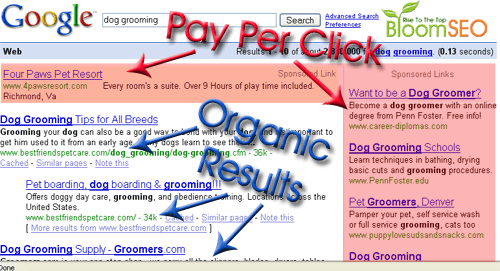Paid Search – why bother?
Mar 10th, 2011 by irfandhanani
Organic search results are listings on a search engine results pages that appear because of their relevance and quality to the search terms entered as opposed to paid advertisements on those pages. In contrast, paid search results appear in opportune spots on a search engine results page, but at a cost.
On March 9th 2011, eMarketer released an article based on User Centric’s findings, and explains that Paid search ads tend to be overlooked; the findings show that organic search results were viewed 100% of the time and that users spent, on average, about 10x longer looking at these results when compared to paid ads on search engines. Right hand side paid ads were only seen 28% of the time on Google, and 21% of the time on Bing (read more…).
The implications of this simply mean that Search Engine Optimization is extremely important; at the same time however, it cannot be concluded that Paid Search should be dismissed in exchange for SEO of Organic Search. A recent survey conducted by Anil Batra shows that the bounce rate of users that clicked on paid ads that had “unique” landing pages was much lower than those without. Furthermore, in many cases, paid ads that had ‘unique’ landing pages also had, on average, lower bounce rates than a website accessed through organic search (read more…).
Organic Search
Advantages:
- Free – does not cost anything
- Generates more traffic as most people pay attention to the organic search results, especially as they get more knowledgeable about the relevance of SEO and how paid advertising works.
- Ranking generally lasts as the historical clicks and attention to a website is recorded, and therefore helps maintain if not improve the ranking during times of re-evaluation periods by search engines
Disadvantages:
- If a website’s search ranking is low, very little traffic will be generated
- Website investment is required (need a relevant, great quality and content, and appealing website)
- Improving search ranking takes time, and there may be a high level of competition for key terms relevant to the website content
Paid Search
Advantages:
- Targeting by geography, time, and choice of keywords gives website administrators and marketers more control over which and when users see advertisements, as well as what they see as the advertisement description
- Can choose to run the advertising as a campaign, and quickly get results to find what is working and what isn’t
- Unique landing page control such that users land on the webpage of administrative choice
Disadvantages:
- Costs money (either per click, or by number of impressions)
- Impressions and clicks may not turn into conversions
- There is a continuous increase in competition

In deciding which to use, or both, an organization/administrator should consider the goals that are to be attained, and how to achieve them through the understanding of the advantages and disadvantages of both.
